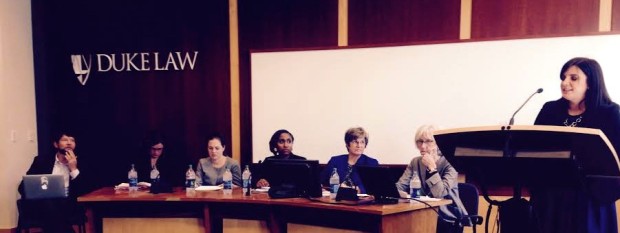Last Tuesday, academics and advocates discussed the implications for reproductive rights and religious freedoms after the Burwell v. Hobby Lobby Supreme Court decision at Duke University Law School. The event was co-sponsored and organized by the Women Law Students Association (WLSA), the American Constitution Society (ACS), and the American Civil Liberties Union (ACLU), and funded by the Duke Bar Association (DBA).
On June 30, 2014 the Supreme Court issued a decision in the Hobby Lobby case. It held that closely held, for-profit companies with religious objections to following the federal health care law’s requirement to provide coverage for birth control in their employee health plan do not have to do so because they are protected by a federal law known as the Religious Freedom Restoration Act (RFRA).

Katie Karges, from the Duke Women’s Law Student’s Association, introduces the panelist and moderator Duke Law Professor Katherine Bartlett.
Judy Waxman, Vice President for Health and Reproductive Rights at National Women’s Law Center, stressed that the number one issue issue at stake in the Burwell v. Hobby Lobby Supreme Court decision is women’s health. Waxman explained that this decision has severe economic impacts for women. She noted that the cost of many of the contraception methods excluded by Hobby Lobby are some of the most effective and for workers earning the minimum wage, are close to a month’s full-time pay. She added that this decision allows a boss’s religion to trump an employee’s.
Stating that half of the pregnancies in the United States are unintended and that 99% of women will use some form of birth control in their lifetime, Kristine Kippins of the Federal Policy Counsel Center for Reproductive Rights used statistics to convey her message that the economic benefit of no-cost contraception on a woman’s life is great. Notably, Kippins stated that “religious liberty is supposed to be a shield not a sword.”
Suzanne Buckley, NARAL NC‘s Executive Director added that this decision is about discrimination against women, the burden of which will be felt most heavily by poor women, women of color, hourly wage workers at corporations like Hobby Lobby, and women and families who are already struggling to make ends meet. She noted that 648,000 NC women are in need of publicly funded contraceptive services, and over 600,000 lack health insurance coverage. The vast majority of women that already lack insurance are women of color—51.5% of Hispanic women and 25.6% of black women in NC are uninsured. Buckley emphasized that the ability to decide when, how, if and with whom to make a family is critical to women’s health and well-being and our economic security. She stated that access to affordable contraception is critical to women’s ability to manage our future, and the families we already have. She added, “The Hobby Lobby decision takes birth control out of the hands of women who need it—and may not be able to get it otherwise.”
Buckley also explained that North Carolina has a “contraceptive equity” law that requires insurance plans in NC to cover contraception. North Carolina’s contraceptive equity law is a separate legal requirement on insurance plans in NC that is not impacted by the Hobby Lobby decision. While NC’s contraceptive equity law (N.C. G.S. § 58-3-178) will remain in effect, NC’s law does not provide no-cost contraceptive coverage and does not cover employees of self-funded or self-insured companies.
Jessica Waters, the Associate Dean of the School of Public Affairs at American University, noted many implications of the Burwell v. Hobby Lobby Supreme Court decision. Waters noted how our justice system conflates gender and morality, but stressed how Hobby Lobby attacks women.
Jed Purdy, a Duke Law Professor, asked the audience to ponder whose freedom of religion should count: a corporation or an employee? Purdy questioned the definition of reproductive freedom: does reproductive freedom mean the right to choose, or does reproductive freedom require access and financial ability to make and follow through with a choice? Purdy stressed how the Hobby Lobby decision adds to the economic and social power of corporations.
Looking forward, the North Carolina General Assembly could try to amend NC’s contraceptive equity law to broaden the exceptions and allow certain for-profit corporations, all corporations, or any entity with a religious objection to get out of complying with the law. The NC General Assembly will also likely consider attempting to pass a state RFRA, thereby creating a state version of the Hobby Lobby decision.
It’s more important than ever that we vote to elect candidates that share out values, like access to affordable birth control and protecting North Carolina women and families.
